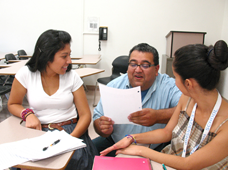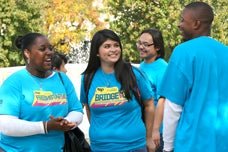The Mission
 For a mentor, the mentoring relationship engenders equal concern for the student's academic achievement and for her/his humanity as a person. For a student mentee, the mentoring relationship means that the faculty member (or staff personnel, administrator, or student peer) becomes a trusted ally, guide, facilitator, sounding board, and advocate, but also, someone who is more than a simple "role model": the mentor becomes recognized and valued by the student not only as a professional but as a human resource and above all, as a person, who facilitates the student's capacity to move beyond the constraints of any preconceived "role" or any rigidly defined "model."
For a mentor, the mentoring relationship engenders equal concern for the student's academic achievement and for her/his humanity as a person. For a student mentee, the mentoring relationship means that the faculty member (or staff personnel, administrator, or student peer) becomes a trusted ally, guide, facilitator, sounding board, and advocate, but also, someone who is more than a simple "role model": the mentor becomes recognized and valued by the student not only as a professional but as a human resource and above all, as a person, who facilitates the student's capacity to move beyond the constraints of any preconceived "role" or any rigidly defined "model."

Those engaged in mentoring relationships never lose sight of the difference between mentor and mentee; but they always remain open to the possibility for exceeding the constraints of either role, as "teacher" or as "student," such that both parties might learn and teach at different times,and consequently, both might become benefactors and beneficiaries of the relationship. The Faculty Mentor Program seeks to realize this vision of mentoring through mentor/mentee training and through direct mentoring services and programs.
Guiding Principles CSUN Faculty Mentor Program
1. The process of both formal and informal mentoring at Cal State Northridge is understood to be an integral part of the university's overall efforts in support of educational equity and diversity, student achievement, retention, and graduation.
2. Mentoring is predicated upon a holistic concern about students as complex, multi-faceted individuals, whose needs, goals, interests, and aspirations include but are not limited to the academic setting. Career, social, and personal considerations warrant equal consideration and care.
3. Mentoring, mentor training, and mentoring services can and should take multiple forms. There is no single prescription or formula that mentoring follows or provides in meeting the needs of students. Equally, all members of the campus community are potential mentors: faculty, staff, administrators, and students.
4. Mentoring pervades the overall repertoire of academic practices (teaching and conducting scholarly work) and student support services (advisement, tutoring, and counseling). Mentoring is a liberatory process by which teaching, advising, tutoring, and counseling can be practiced.
5. Mentoring and mentoring services are best delivered in "local" (college-and/or department-specific) venues and through "naturally occurring" (informal) practices. Local, naturally occurring mentoring is most responsive to situational demands, practical constraints and most importantly, to students' developmental needs and long-term goals.





